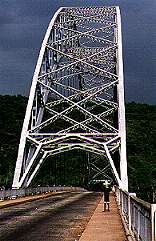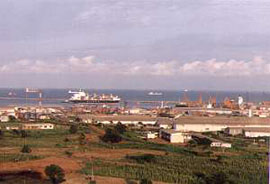 Strong commitment to infrastructure development Strong commitment to infrastructure development
An efficient transport sector is crucial to Ghana's policy in positioning the country as a gateway to the African market. At the start of the country's Economic Recovery Program in 1983, the transport sector was in a deplorable state, with only 15 % of the roads in good condition. This was a major setback for a country almost entirely dependent on its road network for freight and passenger traffic.

At present, road works are in progress to achieve, by the end of the year, an average road network quality of 42 % good condition, 26 % fair condition and not more than 32 % judged in poor repair. This is, however, substantially under the government's target for its Vision 2020 agenda.
"We still have a long way to go, as our objective
is to bring about a mix of 70 % good, 20 % fair
and only 10 % in poor condition," says B. L.
T. Sakibu, Chief Executive of the Ghana
Highway Authority (GHA), the agency responsible
for developing, maintaining and sourcing funds for
Ghana's trunk road network. Ghana has about 39,000
km of roads of varying quality. Of this figure,
15,000 km forms the backbone of the network, directly
supervised by the Authority. In the thirteen years
leading to 1996 it completed forty major road and
bridge development projects, while rehabilitating
over 10,000 km of roads and drainage works.
Insufficient funds have constrained government's ambitious plans for its road network. According to government estimates, US$2.5 billion is needed for its road development program through 2020, much of which is expected to come from the private sector.
(EPZ).
|
"We believe in letting the roads be competitive, paying their true cost of use. We are putting the regulatory framework in place that will allow private sector involvement in the construction of toll roads. We intend to attract private investors to construct roads as good and as durable as can be found in the U.S.," says Edward Salia, Minister of Roads and Transport.
The idea is for private investors to construct strategic roads under license on which they may collect tolls. Upon expiry of their grant thirty to forty years later, the roads will revert to the state. South African, British, Malaysian and South Korean investors have expressed interest in the scheme, with the latter two already active in the country. An American investment group has been slower to act, though it has submitted a proposal for the construction of a major road to the commercial city of Kumasi, the capital of the Ashanti Region.

Concurrently with Ghana's roads program, facilities at the seaports of Tema and Takoradi have been vastly improved, and they have attained high efficiency levels not commonly found in Africa. The comprehensive restructuring plan included port infrastructure rehabilitation, the installation of new cargo handling equipment, and staff training and development.
The average turnaround time at Tema today is 53.4 hours, down from 64.8 hours in 1990. Even more startling is the improvement at Takoradi, where turnaround times were cut to less than half. The seaports are aiming for ever greater levels of efficiency, which will enhance Ghana's gateway status in the region. A US$365 million long-term project, beginning in 1998, will further improve facilities and services at both ports.
Current throughput of 7 million metric tons is less than half of the ports' capacities. There is plenty of room for the expected upswing in cargo movement, to be generated by the recently created Export Processing Zones |

